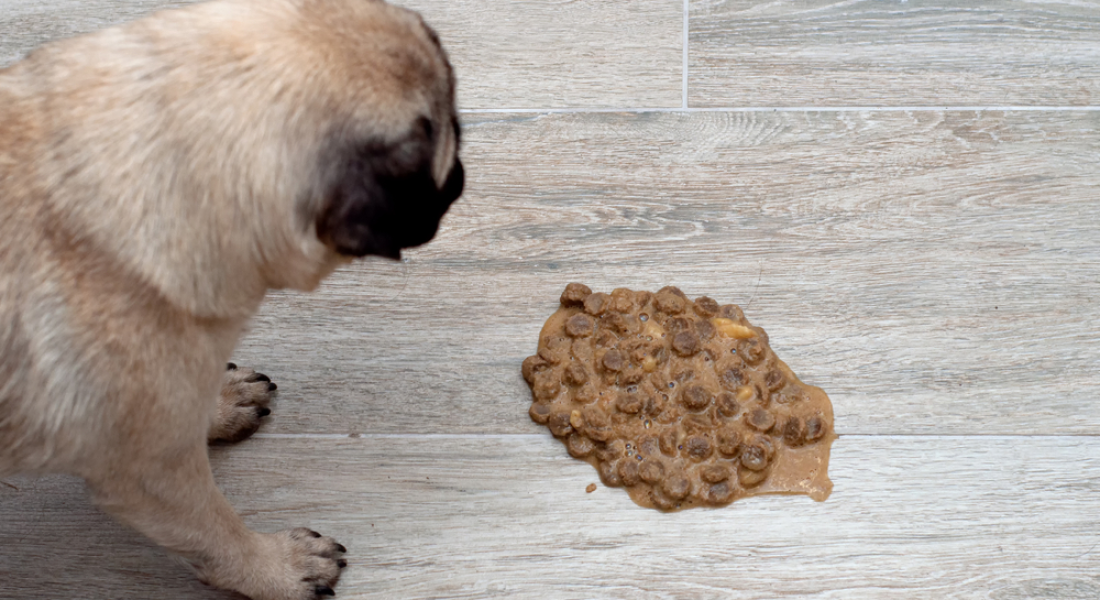Dogs are our best friends, always bringing joy and love into our lives. However, just like humans, dogs can sometimes feel under the weather and experience health issues. One of the most common concerns dog owners face is when their beloved furry friend throws up.
This can be a scary situation for pet parents, but it’s important to stay calm and know what steps to take. In this guide, we will discuss why dogs throw up and what to do when it happens. We will also cover some common causes of vomiting in dogs, as well as signs that may indicate a more serious issue. By the end, you’ll feel confident in handling your dog’s occasional upset stomach.
Understanding Why Dogs Throw Up
The first step in knowing what to do when your dog throws up is understanding why it happens. Vomiting, also known as emesis, is a natural response of the body to get rid of something that doesn’t agree with it. In other words, throwing up is the body’s way of protecting itself by expelling potential toxins or irritants.
There are various reasons why dogs may vomit, and it’s essential to determine the cause in order to properly address it. Some common causes of vomiting in dogs include:
- Eating too quickly or overeating
- Ingesting something indigestible or toxic
- Motion sickness or car rides
- Changes in diet or eating habits
- Stress or anxiety
What To Do When Your Dog Throws Up
Now that you understand why dogs vomit, let’s discuss what to do when it happens. The first thing to remember is not to panic. Vomiting can be a natural response and may not always indicate a serious health issue.
If your dog has only thrown up once or twice and seems otherwise fine, you can try the following steps:
- Remove food and water: Take away your dog’s food and water for a few hours to allow their stomach to settle.
- Monitor for more vomiting: Keep an eye on your dog to see if they vomit again, as this could indicate a more serious issue.
- Offer small amounts of water: After a few hours, you can offer your dog small sips of water to prevent dehydration.
- Introduce a bland diet: Once your dog’s stomach has settled, you can try giving them a small amount of plain, boiled chicken and white rice as a gentle meal.
- Consult with a veterinarian: If your dog continues to vomit or shows other concerning symptoms, it’s best to consult with a veterinarian for proper diagnosis and treatment.
If your dog continues to vomit or exhibits other concerning symptoms, it’s best to consult with your veterinarian for proper diagnosis and treatment.
Signs of a More Serious Issue
While occasional vomiting may not be cause for concern, there are some signs that may indicate a more serious issue. These include:
- Frequent or persistent vomiting
- Blood in vomit
- Lethargy and lack of appetite
- Abdominal pain or bloating
If you notice any of these signs, it’s important to seek immediate veterinary care for your dog. They may require medication or further tests to determine the underlying cause.
Why It’s Important to Address Vomiting in Dogs
Even though occasional vomiting may not be cause for concern, it’s still important to address the issue promptly. Not only can repeated vomiting lead to dehydration and malnutrition, but it can also indicate a more serious underlying health condition.
By paying attention to your dog’s vomiting patterns and seeking veterinary care when needed, you can ensure your furry friend stays healthy and happy. Remember to always consult with a veterinarian if you have any concerns about your dog’s health.
Finally, remember to give lots of love and comfort to your dog during this time as it can be stressful for them too. So cuddle up on the couch together and enjoy some bonding time while they recover.
Mistakes that Can Make Dog Vomiting Worse
While you may be tempted to do everything in your power to make your dog feel better, there are a few things you should avoid doing when they’re experiencing vomiting. These include:
- Giving them human medications without consulting a veterinarian
- Feeding them fatty or spicy foods
- Withholding water for an extended period of time
- Ignoring signs of a more serious issue
By avoiding these mistakes, you can ensure that your dog gets the proper care they need and limit any potential complications.
Tips for Preventing Vomiting in Dogs
Prevention is always the best approach when it comes to your dog’s health. Here are a few tips to help prevent vomiting in dogs:
- Monitor your dog’s eating habits: Make sure your dog isn’t eating too fast or overeating, as this can lead to vomiting.
- Keep potential toxins out of reach: Dogs are natural scavengers and may ingest something toxic, so be mindful of what they have access to.
- Gradually introduce new foods: If you plan on changing your dog’s diet, do it gradually to avoid digestive upset.
- Keep car rides short: If your dog is prone to motion sickness, keep car rides short or consult with a veterinarian for safe medication options.
Conclusion
In summary, occasional vomiting in dogs may not always be a cause for concern, but it’s essential to address the issue promptly and properly. Remember to stay calm and assess the situation, offer small amounts of water, and consult with a veterinarian if needed.
By following these guidelines and being mindful of potential causes, you can help keep your dog healthy and happy. And most importantly, give them lots of love and affection during this time as they recover.
Also, remember to always consult with your veterinarian if you have any concerns about your dog’s health. They are the best resource for proper diagnosis and treatment. With the right care and attention, your furry friend will be back to their happy, playful selves in no time. So don’t hesitate to seek help when needed and keep your pup healthy and thriving!
Happy pet parenting!




